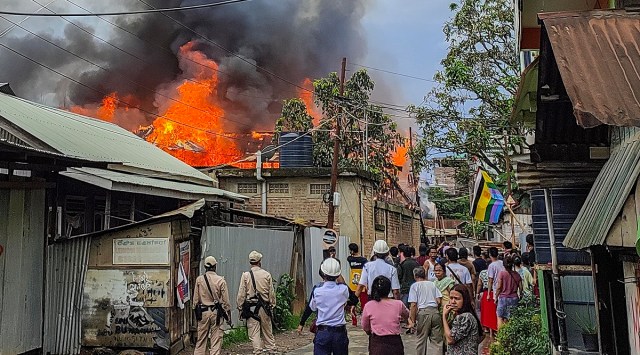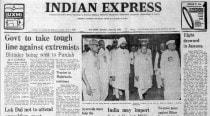The complexity of Manipur conflict: Ethnic diversity, economic downturn and the China factor
The solution for peaceful co-existence has to be found by the people of Manipur themselves. So, while we have a centrally-deputed judicial commission looking into the matter, there is a need for a Civil Society Peace Committee that looks into the Kuki-Meitei divide
 Unidentified miscreants torch two houses belonging to a particular community to retaliate the killing of nine civilians by Kuki militants, in Manipur, Jun 15, 2023. (PTI)
Unidentified miscreants torch two houses belonging to a particular community to retaliate the killing of nine civilians by Kuki militants, in Manipur, Jun 15, 2023. (PTI) Written by Manoj Pant and Arun Sahni
The ethnic clashes in Manipur have once again brought into focus the fragility of and schisms in the social fabric in the northeastern states. The issues due to tribal-non tribal and ethnic diversity make them extremely sensitive to actions that disrupt the equilibrium. Actions can trigger violent reactions and activate dormant antagonisms. The current situation in Manipur is one such manifestation. It was triggered by the Manipur High Court’s direction to the state to expedite ST status for Meiteis. However, the underlying reasons for the conflict are complex.
The clashes have resulted in an avoidable loss of human life and misery, including the dislocation of innumerable families of both the Kuki and Meitei communities to safe spots and military camps. There has also been extensive burning and destruction of private and government properties. The timing of the decision for ST status for Meiteis was inopportune, as the Kuki were upset with the state’s political dispensation due to its recent drive against poppy cultivation and illegal settlements in Reserve Forests. This crackdown on a major source of livelihood and the ST decision was the proverbial straw that broke the camel’s back.
The clock cannot be turned back but the actions initiated by Union Home Minister Amit Shah could help. However, there is an urgent necessity to find lasting solutions, as this disruption to peace and tranquillity is not harmful to the inclusive growth and development of the region but also to the initiatives underway to give shape to India’s Act East Policy. This is, of course, far easier said than done as the Northeast is ethnically and linguistically amongst the most diverse regions in Asia. It has more than 200 ethnic groups with distinct languages, dialects and socio-cultural identities. Events in one state are intricately intertwined and influenced/influence events in not only the neighbouring states but also in bordering Myanmar and Bangladesh. This is especially relevant for Manipur as it jostles with the Naga-Kuki-Meitei tensions. In the case of Naga and Kuki tribes, the challenge is compounded by their tribal linkages in the adjoining states of Nagaland, Mizoram and Assam but also with those residing in Myanmar Naga Hills and the Chin State of Myanmar. The VBIGs (a collaboration of multiple extremist outfits) along with other anti-national groups are being exploited by the Chinese to further their nefarious designs against the Indian state. This not only adds complexity to the ongoing strife between the Kuki and Meitei communities, in the lower hills and plains of Manipur but impacts national security.
A deeper underlying reason for the violence can be seen in the economic markers/ statistics over an extended period. In 1993, Manipur had the highest per capita income amongst the eight NE states — today, it has the lowest. The reasons are the past unrest in Nagaland and Assam in particular, resulting in the blocking of all land routes and supplies to Manipur (this problem has been resolved recently). In addition, there are Manipur’s linkages to Myanmar and the operation of insurgent groups operating from there till recently. Consequently, businesses exited the state and development was hampered. Manipuris in general, and Meiteis in particular, found that the only option was to look outside the region for jobs. Hence, reservation seemed attractive to the Meitei and is obviously resented by the Kuki. The latter, in turn, hemmed in by the Naga on one side and the Meitei in the plains, feel cornered. This enduring problem needs a grounded solution.
First, the solution for peaceful co-existence has to be found by the people of Manipur themselves. So, while we have a centrally-deputed judicial commission looking into the matter, there is a need for a Civil Society Peace Committee that looks into the Kuki-Meitei divide. This could be headed by a prominent person from the Naga community of Manipur. The committee should also have suitable retired government and uniformed officers, who may not be Manipuri by birth but have lasting interests in peace in the state due to familial or financial linkages.
Second, there is a need for the media to exercise restraint and maturity in reporting and discussing these events on podcasts, interviews, etc. Their leading, suggestive questions, due to the political leanings or dislike for the current political dispensation, add fuel to the fire and create undue emotional hype.
Third, there is a need for the government to contextualise at times the divisive impact of privileges accorded to different sections of the society by central and state government policies. This is relevant, especially in the case of Manipur where historically, the same ethnic mix of the population lived in harmony when it was an independent kingdom and later a democracy, prior to India’s independence. The special privileges accorded to the hill tribes, post-independence and applied universally within the country have created artificial boundaries and new reasons for friction where none existed.
The bottom line? While a regional committee as suggested will create some peace, a long-lasting solution needs economic revival in the region and the end of the scourge of insurgent groups.
Pant is former VC, IIFT and Economic Advisor, Government of Nagaland. Sahni is former Army Commander and GOC of the Dimapur Corps responsible for the Northeast region







































